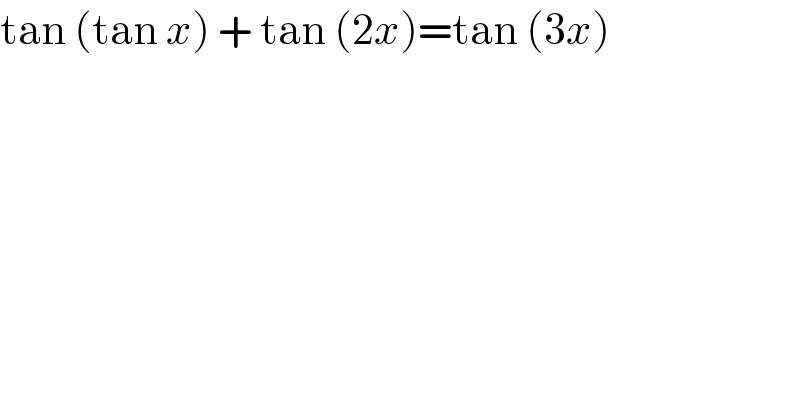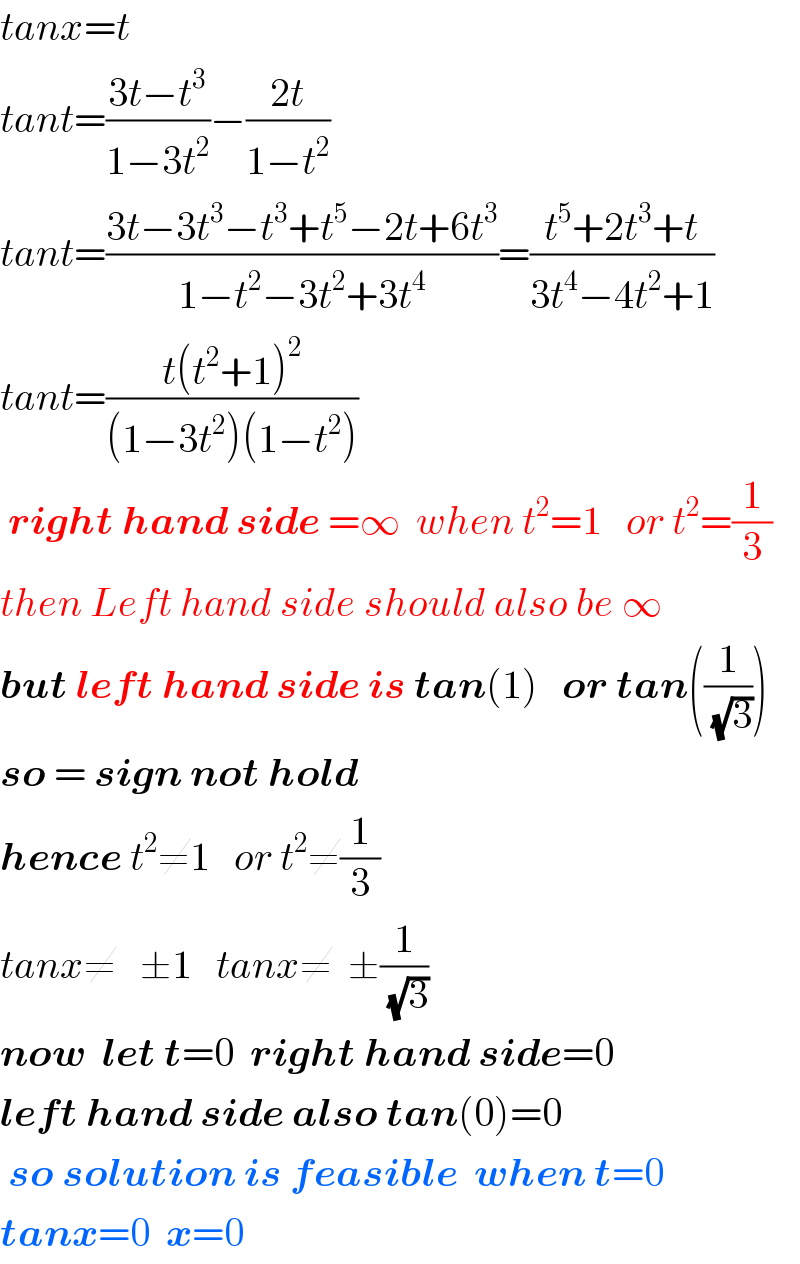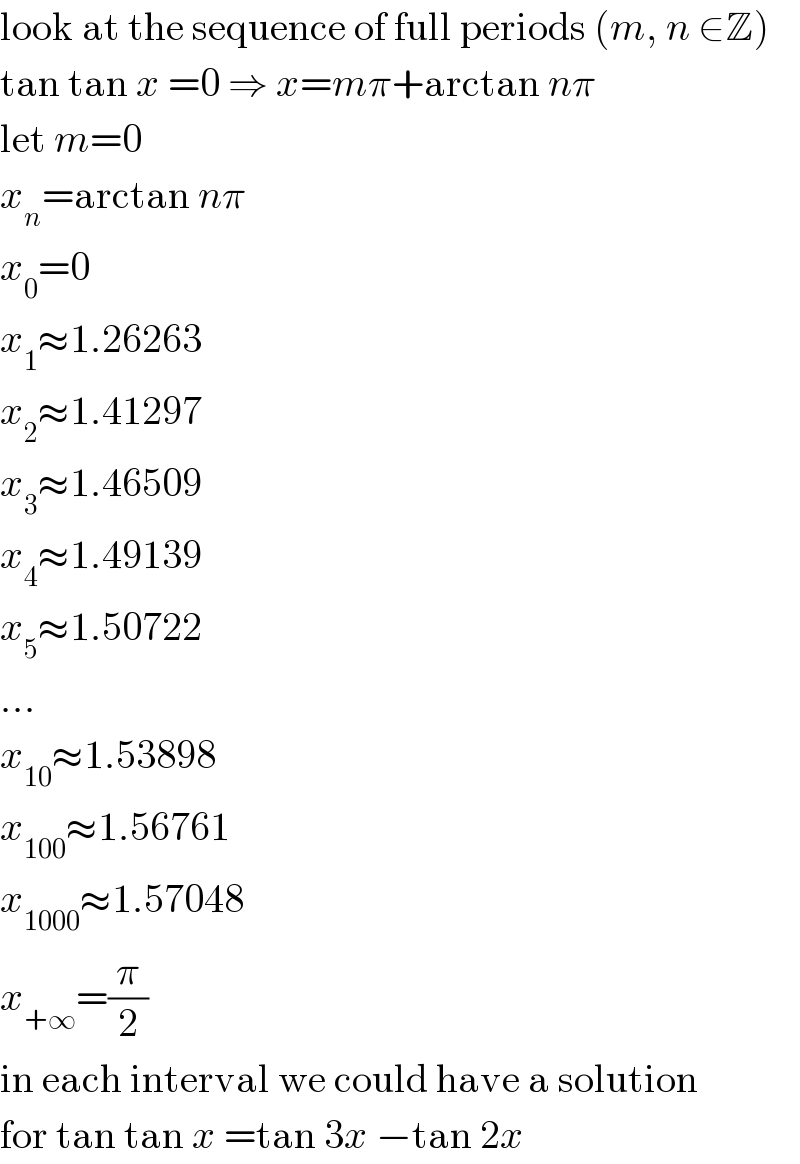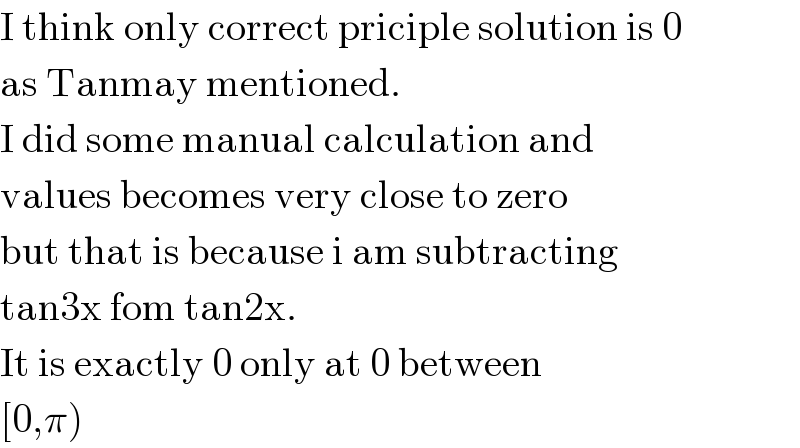
Question Number 118120 by bemath last updated on 15/Oct/20

$$\mathrm{tan}\:\left(\mathrm{tan}\:{x}\right)\:+\:\mathrm{tan}\:\left(\mathrm{2}{x}\right)=\mathrm{tan}\:\left(\mathrm{3}{x}\right) \\ $$
Commented by MJS_new last updated on 15/Oct/20

$$\mathrm{not}\:\mathrm{possible}\:\mathrm{to}\:\mathrm{completely}\:\mathrm{solve}\:\mathrm{it} \\ $$
Answered by TANMAY PANACEA last updated on 15/Oct/20

$${tanx}={t} \\ $$$${tant}=\frac{\mathrm{3}{t}−{t}^{\mathrm{3}} }{\mathrm{1}−\mathrm{3}{t}^{\mathrm{2}} }−\frac{\mathrm{2}{t}}{\mathrm{1}−{t}^{\mathrm{2}} } \\ $$$${tant}=\frac{\mathrm{3}{t}−\mathrm{3}{t}^{\mathrm{3}} −{t}^{\mathrm{3}} +{t}^{\mathrm{5}} −\mathrm{2}{t}+\mathrm{6}{t}^{\mathrm{3}} }{\mathrm{1}−{t}^{\mathrm{2}} −\mathrm{3}{t}^{\mathrm{2}} +\mathrm{3}{t}^{\mathrm{4}} }=\frac{{t}^{\mathrm{5}} +\mathrm{2}{t}^{\mathrm{3}} +{t}}{\mathrm{3}{t}^{\mathrm{4}} −\mathrm{4}{t}^{\mathrm{2}} +\mathrm{1}} \\ $$$${tant}=\frac{{t}\left({t}^{\mathrm{2}} +\mathrm{1}\right)^{\mathrm{2}} }{\left(\mathrm{1}−\mathrm{3}{t}^{\mathrm{2}} \right)\left(\mathrm{1}−{t}^{\mathrm{2}} \right)} \\ $$$$\:\boldsymbol{{right}}\:\boldsymbol{{hand}}\:\boldsymbol{{side}}\:=\infty\:\:{when}\:{t}^{\mathrm{2}} =\mathrm{1}\:\:\:{or}\:{t}^{\mathrm{2}} =\frac{\mathrm{1}}{\mathrm{3}} \\ $$$${then}\:{Left}\:{hand}\:{side}\:{should}\:{also}\:{be}\:\infty \\ $$$$\boldsymbol{{but}}\:\boldsymbol{{left}}\:\boldsymbol{{hand}}\:\boldsymbol{{side}}\:\boldsymbol{{is}}\:\boldsymbol{{tan}}\left(\mathrm{1}\right)\:\:\:\boldsymbol{{or}}\:\boldsymbol{{tan}}\left(\frac{\mathrm{1}}{\:\sqrt{\mathrm{3}}}\right) \\ $$$$\boldsymbol{{so}}\:=\:\boldsymbol{{sign}}\:\boldsymbol{{not}}\:\boldsymbol{{hold}} \\ $$$$\boldsymbol{{hence}}\:{t}^{\mathrm{2}} \neq\mathrm{1}\:\:\:{or}\:{t}^{\mathrm{2}} \neq\frac{\mathrm{1}}{\mathrm{3}} \\ $$$${tanx}\neq\:\:\:\pm\mathrm{1}\:\:\:{tanx}\neq\:\:\pm\frac{\mathrm{1}}{\:\sqrt{\mathrm{3}}}\:\: \\ $$$$\boldsymbol{{now}}\:\:\boldsymbol{{let}}\:\boldsymbol{{t}}=\mathrm{0}\:\:\boldsymbol{{right}}\:\boldsymbol{{hand}}\:\boldsymbol{{side}}=\mathrm{0} \\ $$$$\boldsymbol{{left}}\:\boldsymbol{{hand}}\:\boldsymbol{{side}}\:\boldsymbol{{also}}\:\boldsymbol{{tan}}\left(\mathrm{0}\right)=\mathrm{0} \\ $$$$\:\boldsymbol{{so}}\:\boldsymbol{{solution}}\:\boldsymbol{{is}}\:\boldsymbol{{feasible}}\:\:\boldsymbol{{when}}\:\boldsymbol{{t}}=\mathrm{0} \\ $$$$\boldsymbol{{tanx}}=\mathrm{0}\:\:\boldsymbol{{x}}=\mathrm{0} \\ $$
Commented by 1549442205PVT last updated on 15/Oct/20

$$\mathrm{I}\:\mathrm{think}\:\mathrm{that}\:\mathrm{is}\:\mathrm{imcomplete}\:\mathrm{conclusion} \\ $$$$\mathrm{It}\:\mathrm{can}\:\mathrm{ocurr}\:\mathrm{that}\:\mathrm{LHS}=\mathrm{RHS}\:\mathrm{for} \\ $$$$\mathrm{x}\neq\mathrm{0},\mathrm{tanx}\neq\pm\mathrm{1},\mathrm{tanx}\neq\pm\frac{\mathrm{1}}{\:\sqrt{\mathrm{3}}} \\ $$
Commented by TANMAY PANACEA last updated on 15/Oct/20

$${sir}\:{at}\:{x}=\mathrm{0}\:\:\:\:\:{LHS}={RHS}\:\:\:{pls}\:{check} \\ $$
Commented by prakash jain last updated on 15/Oct/20
https://www.wolframalpha.com/input/?i=tan+%28tan+x%29+%2B+tan+%282x%29%3Dtan+%283x%29
Commented by MJS_new last updated on 15/Oct/20

$$\mathrm{I}\:\mathrm{don}'\mathrm{t}\:\mathrm{think}\:\mathrm{Wolfram}\:\mathrm{Alpha}\:\mathrm{found}\:{all}\:\mathrm{solutions} \\ $$
Commented by prakash jain last updated on 15/Oct/20

$$\mathrm{Wolfram}\:\mathrm{alpha}\:\mathrm{should}\:\mathrm{give}\:\mathrm{all} \\ $$$$\mathrm{principle}\:\mathrm{solutions}. \\ $$$$\mathrm{if}\:{x}\:\mathrm{is}\:\mathrm{solution}\:\mathrm{than}\:{x}+\mathrm{2}\pi\:\mathrm{is}\:\mathrm{also} \\ $$$$\mathrm{solution}. \\ $$
Commented by MJS_new last updated on 15/Oct/20
![look at the interval [0; (π/2)] we have 0≤tan x<+∞ ⇒ tan tan x runs through ]−∞; +∞[ infinite times ⇒ we could get infinite solutions for the given equation, most of them very close to x=(π/2)∧x<(π/2). I′m not 100% sure but...](Q118202.png)
$$\mathrm{look}\:\mathrm{at}\:\mathrm{the}\:\mathrm{interval}\:\left[\mathrm{0};\:\frac{\pi}{\mathrm{2}}\right] \\ $$$$\mathrm{we}\:\mathrm{have}\:\mathrm{0}\leqslant\mathrm{tan}\:{x}<+\infty \\ $$$$\left.\Rightarrow\:\mathrm{tan}\:\mathrm{tan}\:{x}\:\mathrm{runs}\:\mathrm{through}\:\right]−\infty;\:+\infty\left[\:\mathrm{infinite}\right. \\ $$$$\mathrm{times}\:\Rightarrow\:\mathrm{we}\:\mathrm{could}\:\mathrm{get}\:\mathrm{infinite}\:\mathrm{solutions}\:\mathrm{for} \\ $$$$\mathrm{the}\:\mathrm{given}\:\mathrm{equation},\:\mathrm{most}\:\mathrm{of}\:\mathrm{them}\:\mathrm{very}\:\mathrm{close} \\ $$$$\mathrm{to}\:{x}=\frac{\pi}{\mathrm{2}}\wedge{x}<\frac{\pi}{\mathrm{2}}.\:\mathrm{I}'\mathrm{m}\:\mathrm{not}\:\mathrm{100\%}\:\mathrm{sure}\:\mathrm{but}... \\ $$
Commented by MJS_new last updated on 15/Oct/20

$$\mathrm{look}\:\mathrm{at}\:\mathrm{the}\:\mathrm{sequence}\:\mathrm{of}\:\mathrm{full}\:\mathrm{periods}\:\left({m},\:{n}\:\in\mathbb{Z}\right) \\ $$$$\mathrm{tan}\:\mathrm{tan}\:{x}\:=\mathrm{0}\:\Rightarrow\:{x}={m}\pi+\mathrm{arctan}\:{n}\pi \\ $$$$\mathrm{let}\:{m}=\mathrm{0} \\ $$$${x}_{{n}} =\mathrm{arctan}\:{n}\pi \\ $$$${x}_{\mathrm{0}} =\mathrm{0} \\ $$$${x}_{\mathrm{1}} \approx\mathrm{1}.\mathrm{26263} \\ $$$${x}_{\mathrm{2}} \approx\mathrm{1}.\mathrm{41297} \\ $$$${x}_{\mathrm{3}} \approx\mathrm{1}.\mathrm{46509} \\ $$$${x}_{\mathrm{4}} \approx\mathrm{1}.\mathrm{49139} \\ $$$${x}_{\mathrm{5}} \approx\mathrm{1}.\mathrm{50722} \\ $$$$... \\ $$$${x}_{\mathrm{10}} \approx\mathrm{1}.\mathrm{53898} \\ $$$${x}_{\mathrm{100}} \approx\mathrm{1}.\mathrm{56761} \\ $$$${x}_{\mathrm{1000}} \approx\mathrm{1}.\mathrm{57048} \\ $$$${x}_{+\infty} =\frac{\pi}{\mathrm{2}} \\ $$$$\mathrm{in}\:\mathrm{each}\:\mathrm{interval}\:\mathrm{we}\:\mathrm{could}\:\mathrm{have}\:\mathrm{a}\:\mathrm{solution} \\ $$$$\mathrm{for}\:\mathrm{tan}\:\mathrm{tan}\:{x}\:=\mathrm{tan}\:\mathrm{3}{x}\:−\mathrm{tan}\:\mathrm{2}{x} \\ $$
Commented by prakash jain last updated on 16/Oct/20

$$\mathrm{I}\:\mathrm{think}\:\mathrm{only}\:\mathrm{correct}\:\mathrm{priciple}\:\mathrm{solution}\:\mathrm{is}\:\mathrm{0} \\ $$$$\mathrm{as}\:\mathrm{Tanmay}\:\mathrm{mentioned}. \\ $$$$\mathrm{I}\:\mathrm{did}\:\mathrm{some}\:\mathrm{manual}\:\mathrm{calculation}\:\mathrm{and} \\ $$$$\mathrm{values}\:\mathrm{becomes}\:\mathrm{very}\:\mathrm{close}\:\mathrm{to}\:\mathrm{zero} \\ $$$$\mathrm{but}\:\mathrm{that}\:\mathrm{is}\:\mathrm{because}\:\mathrm{i}\:\mathrm{am}\:\mathrm{subtracting} \\ $$$$\mathrm{tan3x}\:\mathrm{fom}\:\mathrm{tan2x}. \\ $$$$\mathrm{It}\:\mathrm{is}\:\mathrm{exactly}\:\mathrm{0}\:\mathrm{only}\:\mathrm{at}\:\mathrm{0}\:\mathrm{between} \\ $$$$\left[\mathrm{0},\pi\right) \\ $$
Commented by MJS_new last updated on 17/Oct/20

$$\mathrm{sorry}\:\mathrm{but}\:\mathrm{you}'\mathrm{re}\:\mathrm{wrong}.\:\mathrm{see}\:{question}\:\mathrm{118371} \\ $$
Commented by prakash jain last updated on 17/Oct/20

$$\mathrm{Yes}.\:\mathrm{I}\:\mathrm{made}\:\mathrm{calculation}\:\mathrm{error}. \\ $$$$\mathrm{Realize}\:\mathrm{it}\:\mathrm{now}. \\ $$
